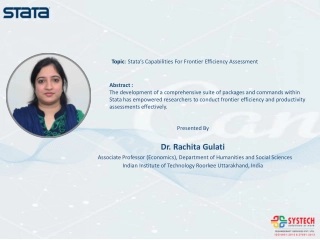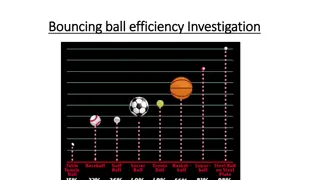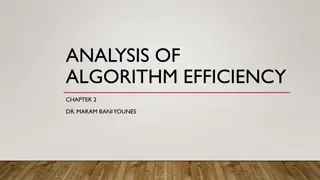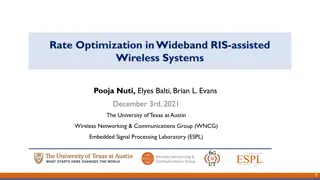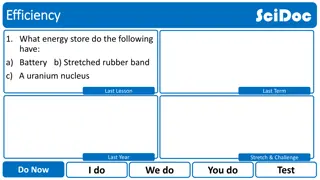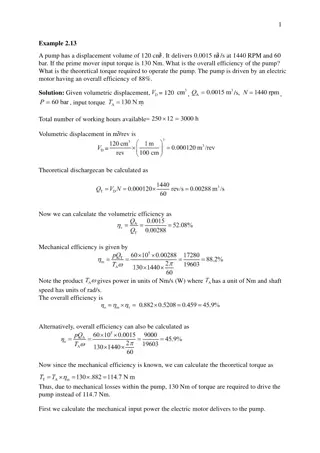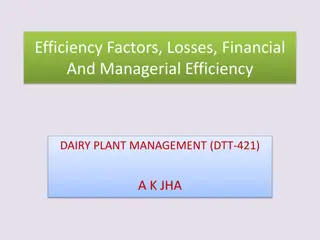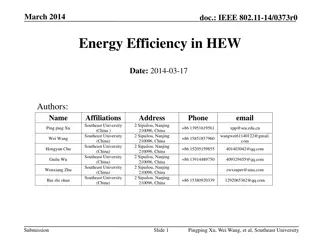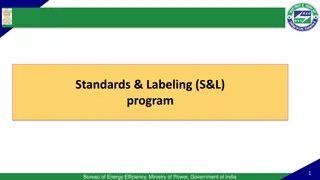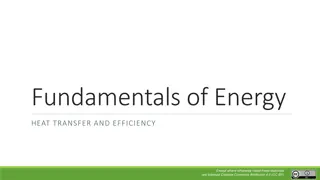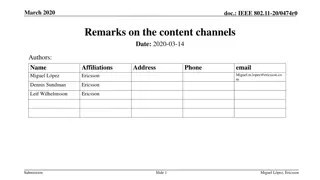
Understanding Algorithms and Data Structures for Computation Efficiency
Explore the art of counting, correctness, and efficiency in algorithms and data structures, with examples and code snippets for measuring time, memory, and runtime performance. Learn about the cost model and steps counting in algorithm implementation for optimization.
Download Presentation

Please find below an Image/Link to download the presentation.
The content on the website is provided AS IS for your information and personal use only. It may not be sold, licensed, or shared on other websites without obtaining consent from the author. If you encounter any issues during the download, it is possible that the publisher has removed the file from their server.
You are allowed to download the files provided on this website for personal or commercial use, subject to the condition that they are used lawfully. All files are the property of their respective owners.
The content on the website is provided AS IS for your information and personal use only. It may not be sold, licensed, or shared on other websites without obtaining consent from the author.
E N D
Presentation Transcript
IDATA2302 Algorithms & Data Structures Computation Efficiency The Art of Counting Foundations / Lecture 4 Franck Chauvel Axbit & NTNU Ask questions on menti.com with code 1384 3192 franck.chauvel@ntnu.no
Correctness and Efficiency Algorithms Problems Programs Algorithm 1 ? ? = 1 + 2 + + ? efficiency Algorithm 2 2
Which one Would you Choose? ? ? =? (? + 1) start = 1 + 2 + + ? 2 sum := 0 each := 0 start [no] each N stop sum tmp*(tmp+1) / 2 each := each + 1 [yes] end sum := sum + each 3
Lets see? ? ? =? (? + 1) = 1 + 2 + + ? 2 #include <stdio.h> #define N 100 N = 100 int main(int argc, char** argv) { int sum = 0; int each = 0; while (each <= N) { sum += each; each = each + 1; } printf("Total: %d\n", sum); } total = (N * (N+1)) / 2 print(f"Total: {total}") 4
Agenda 1. Resources: Time and Memory 2. Measuring Time 1. Cost Model 2. Frequency Count 3. Measuring Memory 4. Example 5
Runtime & Memory The two things that matters (here) 6
Runtime 7
Measuring Runtime Performance testing Many runs + statistics Describe executors/programs more than algorithms! $ time ./ $ time ./a.out Total: 2550 Total: 2550 ./ ./a.out a.out a.out Macbook Air Apple M1 8 cores MacOS 11.3 Python 3.9.5 Apple C-Lang 12.0.5 0.00s user 0.00s system 63% 0.00s user 0.00s system 63% cpu cpu 0.002 total 0.002 total $ time python3 sum.py Total: 2550.0 python3 sum.py 0.01s user 0.01s system 42% cpu 0.046 total 8
Counting Steps segment: data N 1 100 divisor 1 2 total 1 0 N = 100 total = (N * (N+1)) / 2 print(f"Total: {total}") segment: code LOAD 1 ADD N MUL N DIV divisor STORE total PRINT total 5 + 1 6 9
Cost Model Code Mnemonic Parameter Cost segment: data N 1 100 divisor 1 2 total 1 0 1 LOAD LOAD value 1 2 ADD ADD address 1 3 SUBTRACT SUBTRACT address 1 4 STORE STORE address 1 segment: code LOAD 1 ADD N MUL N DIV divisor STORE total PRINT total cost(LOAD) = 1 cost(ADD) = 1 cost(MUL) = 1 cost(DIV) = 1 cost(STORE) = 1 cost(PRINT) = 1 5 JUMP JUMP address 1 6 READ READ address 1 7 PRINT PRINT address 1 ? HALT HALT 1 MUL MUL address ? 6 DIV DIV address ? 10
Takeaway The cost model defines how long every instruction takes. 11
What about Pseudocode? Code int main(int argc, char** argv) { int sum = 0; int each = 0; while (each <= 100) { sum = sum + each; each = each + 1; } printf("Total: %d\n", sum); } Cost Run Count Total 1 1 1 2 2 1 1 1 1 102 101 101 102 202 202 1 1 1 Grand Total 509 12
Runtime Comparison #include <stdio.h> #define N 100 int main(int argc, char** argv) { int sum = 0; int each = 0; while (each <= N) { sum += each; each = each + 1; } printf("Total: %d\n", sum); } N = 100 total = (N * (N+1)) / 2 print(f"Total: {total}") Time = 6 Time = 509 13
Memory The other important resource 14
Measuring Memory $ /usr/bin/time -l python3 sum.py Total: 2550.0 0.04 real 0.01 user 0.01 sys 8257536 maximum resident set size 0 average shared memory size 0 average unshared data size 0 average unshared stack size 493 page reclaims 199 page faults 0 swaps 0 block input operations 0 block output operations 0 messages sent 0 messages received 0 signals received 110 voluntary context switches 16 involuntary context switches 102597177 instructions retired 44639544 cycles elapsed 4932640 peak memory footprint $ /usr/bin/time -l ./a.out Total: 2550 0.00 real 0.00 user 0.00 sys 1245184 maximum resident set size 0 average shared memory size 0 average unshared data size 0 average unshared stack size 81 page reclaims 4 page faults 0 swaps 0 block input operations 0 block output operations 0 messages sent 0 messages received 0 signals received 1 voluntary context switches 4 involuntary context switches 4562725 instructions retired 2047296 cycles elapsed 754456 peak memory footprint 7.8 MiB 1.18 MiB 15
Counting Memory Cells segment: data N 1 100 divisor 1 2 total 1 0 input (ignored) 1 cell output (ignored) LIMIT = 100 half = LIMIT / 2 total = half * (half + 1) print(f"Total: {total}") segment: code LOAD 1 ADD N MUL N DIV divisor STORE total PRINT total 6 instructions 12 cells (ignored) 16
What about Pseudocode? #include <stdio.h> 1 variable, input (ignored) #define N 100 int main(int argc, char** argv) { int sum = 0; int each = 0; while (each <= N) { sum += each; each = each + 1; } printf("Total: %d\n", sum); } 1 variable, output (ignored) 1 variable 17
Memory Comparison #include <stdio.h> #define N 100 LIMIT = 100 int main(int argc, char** argv) { int sum = 0; int each = 0; while (each <= N) { sum += each; each = each + 1; } printf("Total: %d\n", sum); } half = LIMIT / 2 total = half * (half + 1) print(f"Total: {total}") 1 cell 1 cell 18
Full Comparison (for N=100) Runtime Memory 509 1 Loop 6 1 Formula 19
Recap Runtime Counting Cost model cost(op) = 1 Arithmetic Logic Assignments Frequency count Efficiency Depends on the machine Memory CPU Measuring describes programs & machines Memory Counting Variables / cells Ignore code & inputs Just counting things 20
Thank You! Questions, Comments, or Ideas? Franck Chauvel Axbit & NTNU franck.chauvel@ntnu.no
se e t ata t s a te e s sh t se e t c e Lab Session a a s t act t e a a a te e s s t act sh t s a a s a a te e st e s a a a te e st e a te e a t s ha t h e a te e t a te e t s s s a te e a te e a te e t Runtime & Memory efficiency for small programs a te e On RAM assembly On Pseudo-code s e 22
Adding Three Numbers Problem 1: Java public static void main(String[] args) { int total = 0; Scanner input = new Scanner(System.in); total = total + input.nextInt(); total = total + input.nextInt(); total = total + input.nextInt(); System.out.println("Total: " + total); } Runtime Memory 23
Adding Three Numbers Problem 1 SEGMENT: data value 1 0 total 1 0 SEGMENT: code load 0 read value add value read value add value read value add value store total print total halt -1 Runtime Memory 24
Maximum of Two Numbers Problem 2.1: Java public static void main(String[] args) { Scanner input = new Scanner(System.in); int left = input.nextInt(); int right = input.nextInt(); Runtime int maximum = 0; if (left < right) { maximum = right; } else { maximum = left; } Memory System.out.println("Maximum: " + maximum); } 25
Maximum of Two Numbers Problem 4: RAM ASM SEGMENT: data left 1 0 right 1 0 maximum 1 0 SGEMENT: code read left read right load 0 add left subtract right jump lmax load 0 add right store maximum load 0 jump done lmax: load 0 add left store maximum done: print maximum halt -1 Runtime Memory 26
Multiplication Problem 5: Java public static void main(String[] args) { Scanner input = new Scanner(System.in); int multiplicand = input.nextInt(); int multiplier = input.nextInt(); Runtime int result = 0; for (int i=0 ; i<multiplier; i++) { result = result + multiplicand; } Memory System.out.println("Result: " + result); } 27

